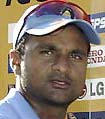
As has always been the case, New Zealand's arrival has been greeted with some routine speculation -- how will they cope against our spinners? Will it be our batsmen versus theirs? Will the visitors finally prevail in India?
Nobody stops to think if fast bowlers too merit a look. It is as if the men with the new red cherry are doomed from the outset.
You can't fault them though. After all, whoever has won a school sack race when everyone else is running with free legs? Fast bowling could be similarly unforgiving in India. If you are lucky, pitches might aid seam some days. Most of the time, they don't.
At times, the new ball looks such a terrible waste. The wickets are placid, there is little bounce, and it is frustrating to see snicks not carry to the wicketkeeper or slips. But as with most things in life, if you are determined you will find your way.
That's been my experience. There is a lot a fast bowler can still achieve even on such unresponsive pitches. A new ball might not be your best ally. But when it gets old, and if you possess a decent pace, the ball will scruff up on rough outfields and dusty pitches and start to reverse-swing. It's a great weapon to have on our pitches.
But this craft takes some learning. If you know the technique and have the pace, it can only be bowled if you are a 140kph plus bowler. It will give you power over the batsmen.
Ours are not the kind of wickets where you can pitch the ball up. If you can keep the length short and force the batsman back, you have a chance to earn leg-before shouts or rattle the stumps. It doesn't matter if the dying bounce is not carrying the snicks to the slips.
With its gradual wear and growing unpredictable bounce, an Indian pitch could turn out to be quite useful to a fast bowler. Especially on the third and fourth days. One only needs to keep the batsmen pinned on the backfoot.
It is also no less important for you to be careful with your attire and shoes. I learnt in due course that if I wanted to avoid a footwear that has been roughed up with constant use, I need to carry four or five pairs of shoes in my kit.
I like to be comfortable in a particular brand of shoes, but am careful with its cushion and sole. It is also helpful if you get rid of your sweat-soaked shirt between long spells.
A shower during a break could be extremely refreshing. Unfortunately, these things are not learnt overnight. Visiting teams in alien conditions take time to adjust and before they do so, the tour has drawn to a close.
There is extra strain placed on fast bowlers with too little gaps between the games. In one-dayers in particular, if you are travelling and the next one-dayer is scheduled in the next 48 hours, the tiredness could sap you of all energy.
Most fast bowlers tend to get tired towards the fag end of a long tour.
There is a lesson in this for fast bowlers of both sides. But batsmen are so clever these days. They come well prepared to the middle, having done their homework and dissection on a bowler's technique on the video.
The pocket-sized dynamo of Sri Lankan cricket was a superb player of reverse swing. He could watch it so early and was always in the right position to play his shots.
New Zealand's batting will draw its inspiration from captain Stephen Fleming who has grown by leaps and bounds in recent times. His handling of Muttiah Muralitharan in Sri Lanka recently shows that the left-hander will be the mainstay against our world-class spinners. Having had a fair amount of success, particularly against Fleming, I can still say he has shown courage and determination even on bowler-friendly wickets.
I can recall Fleming getting runs in the last one-dayer in Hamilton last season when he singlehandedly steered New Zealand out of a tough corner.
New Zealand could have brightened its chances if they had the services of Shane Bond and Chris Cairns in their ranks for the Test matches. Bond is a class act and would have come extremely handy. Cairns too is the kind of all-rounder who is a match-winner with both bat and ball.